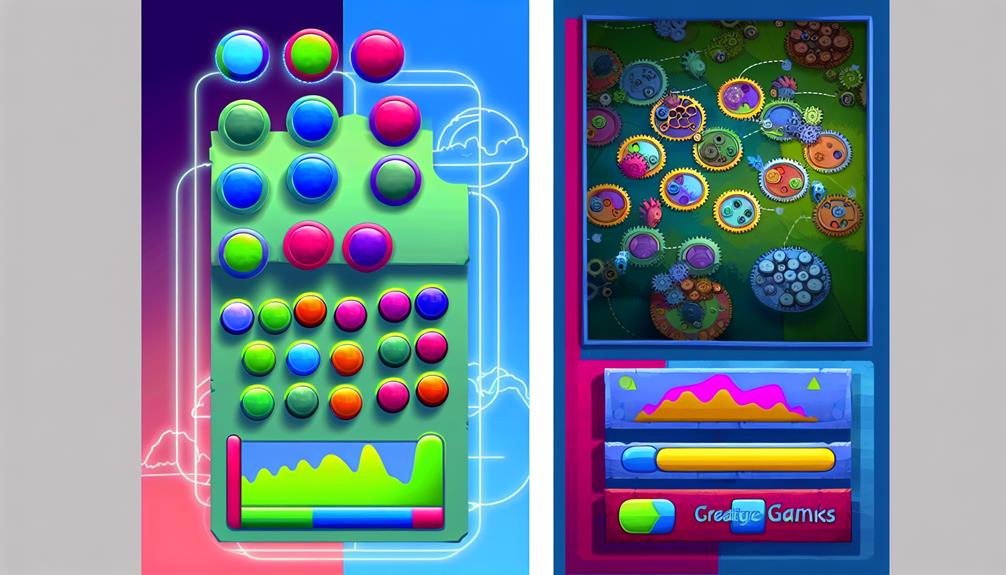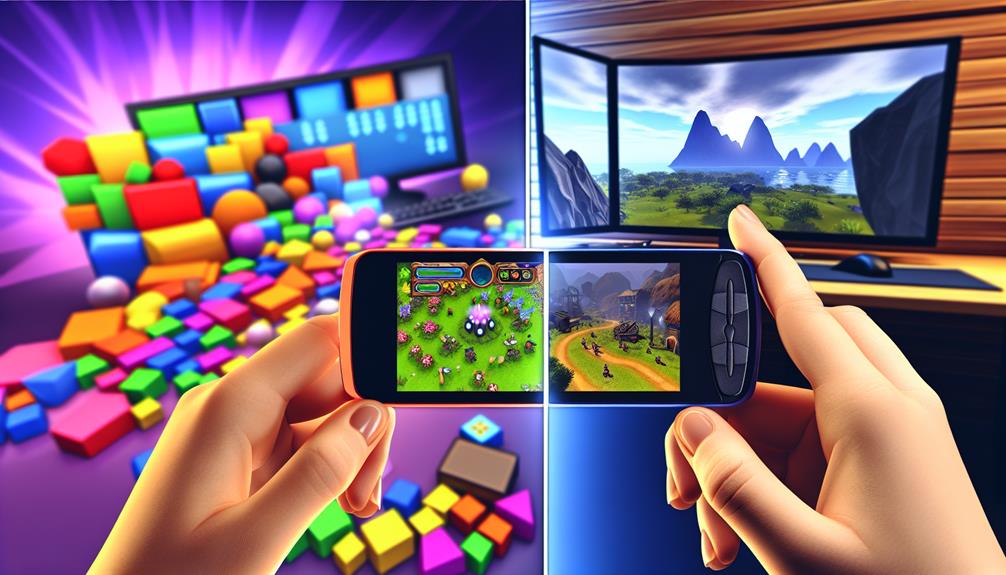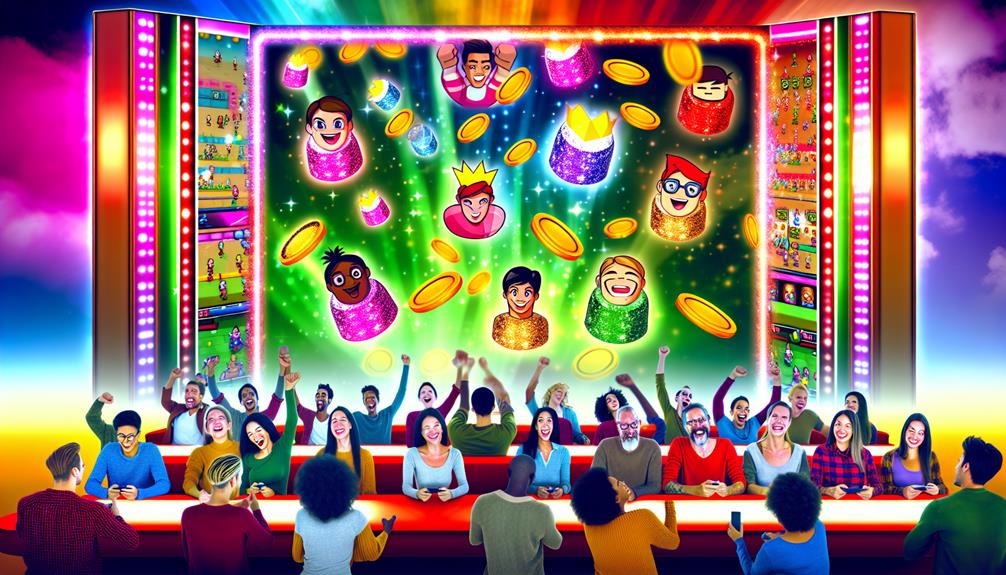Clicker games are addictive due to their intricate combination of psychological rewards, simple yet engaging mechanics, and social dynamics. Players experience a cycle of anticipation and gratification as each click yields rewarding feedback, reinforcing their desire to progress. This immediate satisfaction coupled with the sense of achievement taps into core human needs, creating emotional attachment. Additionally, the communal aspect, with competitive leaderboards and shared milestones, fosters a vibrant environment where players feel connected. These elements make clicker games not just entertaining but also profoundly immersive. Explore the best titles in this genre to discover what makes them so compelling.
Key Takeaways
- Clicker games utilize reward systems that create positive feedback loops, enhancing player engagement and satisfaction through incremental achievements.
- Simple mechanics combined with strategic depth invite players to invest time and develop skills, fostering a sense of mastery.
- Instant gratification from gameplay and the anticipation of unlocking new features keep players returning for prolonged engagement.
- Social interactions, leaderboards, and community events cultivate a sense of belonging and healthy competition among players.
- Popular titles like Cookie Clicker and Adventure Capitalist exemplify the addictive nature of clicker games through immersive gameplay and community support.
The Psychology of Clicker Games

At the heart of clicker games lies a fascinating interplay between user engagement and psychological reward systems. These games are meticulously designed to capitalize on behavioral conditioning, where players repeatedly perform simple actions to achieve progressively larger rewards. This cycle fosters a sense of accomplishment, encouraging continued interaction and investment in the game. Engaging in activities that promote physical fitness can enhance cognitive function, making the rewards in clicker games even more satisfying for players who are mentally sharp and focused, as suggested by finding the right exercise.
Cognitive biases also play a significant role in the addictive nature of clicker games. Players often fall prey to the "sunk cost fallacy," becoming emotionally attached to their progress and unwilling to abandon the game, despite its simplicity. The allure of incremental gains can create a compelling narrative, where each click feels like a step toward a larger goal.
Moreover, the social dynamics inherent in many clicker games cultivate a sense of belonging. Players are often encouraged to share achievements and compete with friends, further enhancing their motivation to engage. The combination of behavioral conditioning and cognitive biases creates a potent formula for addiction, transforming mundane clicks into a rewarding journey that resonates deeply with the human desire for connection and achievement. Fundamentally, clicker games are not merely about gameplay; they tap into the core of our psychological needs.
Reward Systems and Player Engagement
How do reward systems in clicker games keep players glued to their screens? At the heart of this engagement lies the concept of reward anticipation, a psychological mechanism that drives players to seek out and experience gratifying outcomes. Each click triggers a cascade of positive feedback loops, reinforcing the player's actions and cultivating a sense of achievement. This cycle not only motivates continued play but also fosters a community where players share their milestones and strategies, creating a belonging that enhances the gaming experience. Similar to how berberine can enhance metabolic effects, these games stimulate players' desires for progress and success.
Every reward, whether it's a new level, a shiny upgrade, or even in-game currency, acts as a tantalizing carrot on a stick. Players learn to anticipate these rewards, heightening their emotional investment in the game. The allure of revealing new features or surpassing personal bests transforms a simple clicking activity into an addictive pursuit, as players keenly await the next gratifying moment.
Ultimately, the intricate design of reward systems in clicker games not only captivates but also connects players, transforming solitary clicking into a shared journey of exploration and achievement, where each reward serves as a stepping stone towards greater aspirations within the gaming domain.
Simple Mechanics, Complex Strategies

The interplay between simple mechanics and complex strategies is a defining characteristic of clicker games that further enhances their addictive nature. At first glance, the mechanics appear deceptively straightforward—players click to accumulate resources, often with minimal effort. However, beneath this surface simplicity lies a rich tapestry of strategic depth that invites players to engage on multiple levels. This engagement can be likened to strengthening intimacy, where players connect through shared experiences and collaborative decision-making.
Game balance plays an essential role in this dynamic. As players progress, they encounter challenges that require careful planning and decision-making, ensuring that the gameplay remains engaging over time. The initial ease of clicking gives way to the necessity for strategic thinking, as players must optimize their resource management and anticipate future needs. This shift facilitates skill progression, empowering players to develop a deeper understanding of game mechanics and enhance their gameplay experience.
In essence, the allure of clicker games stems from their ability to create a communal atmosphere where players share strategies, fostering a sense of belonging. This combination of simple mechanics with complex strategic layers cultivates an environment ripe for exploration, discussion, and mastery, making each click a step toward deeper engagement and satisfaction.
The Role of Progression
Progression in clicker games serves as a powerful driver of engagement, offering players a sense of instant gratification with each incremental achievement. This mirrors the way Pilates reformer workouts enhance physical capabilities, as they provide measurable progress in strength and flexibility with every session full-body strength gains. The thrill of revealing new features not only enhances gameplay but also fosters a continuous cycle of motivation, compelling players to keep tapping away. As players ascend through levels and disclose new mechanics, the allure of progression transforms simple actions into rewarding experiences.
Instant Gratification Mechanism
In clicker games, the steady increase of numbers on the screen serves as a powerful hook, engaging players through an instant gratification mechanism that taps into our innate desire for progress. This phenomenon is rooted in the instant rewards provided by the gameplay, which trigger a dopamine release in the brain. As players click and watch their scores soar, they experience a surge of pleasure, reinforcing addictive cycles that encourage prolonged engagement.
User feedback is immediate and satisfying, creating a compelling gameplay loop that players find hard to resist. Each click becomes a behavioral trigger, promising quick satisfaction and enhancing reward anticipation. This cycle not only captivates individual players but fosters a sense of community as they share achievements and strategies, solidifying their belonging within the gaming environment.
The allure of instant gratification in clicker games is not just about numbers; it's about a shared human experience of progress and achievement. As players navigate these addictive gameplay loops, they find themselves caught in a web of rewards that continually beckon them back, ensuring that the journey of advancement remains irresistible.
Unlocking New Features
Revealing new features serves as a pivotal element in the allure of clicker games, transforming simple mechanics into a rich tapestry of exploration and discovery. This process of feature discovery not only enhances gameplay variety but also sustains player engagement over time. As players progress, each new feature serves as a milestone that evokes a sense of achievement and belonging within the gaming community.
The anticipation of releasing new elements adds layers to the gaming experience, encouraging players to invest time and effort. This dynamic fosters a community where players share strategies, celebrate achievements, and support each other in their quests for mastery.
| Feature Type | Description | Example Game |
|---|---|---|
| Upgrade Mechanics | Enhances existing capabilities | Cookie Clicker |
| New Game Modes | Introduces different gameplay styles | Adventure Capitalist |
| Unique Characters | Adds diverse abilities and strategies | Clicker Heroes |
Each row represents a dimension of progression that enriches the clicker experience. By embracing these new features, players find themselves increasingly immersed, forging connections not only with the game but also with fellow enthusiasts. This synergy is what makes clicker games so irresistibly addictive.
Social Interaction and Competition

In the domain of clicker games, social interaction and competition greatly amplify player engagement. Features such as multiplayer modes and leaderboards cultivate a sense of rivalry, motivating players to improve their performance while fostering a vibrant community. Additionally, special events can unite participants, further enhancing the shared experience and deepening their investment in the game.
Multiplayer Features Enhance Engagement
Multiplayer features in clicker games greatly amplify player engagement by fostering social interaction and friendly competition. By integrating cooperative gameplay elements, these games encourage players to form alliances, rallying together to achieve shared goals. This sense of community not only enhances the gaming experience but also nurtures a feeling of belonging among players.
Competitive modes further enrich the engagement, inviting players to challenge one another while participating in team challenges that require coordination and strategy. The thrill of competing against friends or even strangers ignites a passion for the game, driving players to invest more time and effort into their progress. As players work collectively towards common objectives, they build strong connections that extend beyond the game itself.
The rewards for such interactions are often social, as players receive accolades and recognition from their peers. These social rewards are instrumental in reinforcing behavior and encouraging continued participation, ensuring that players remain invested in both their individual achievements and the success of their alliances. Ultimately, the multiplayer features in clicker games create a vibrant ecosystem that fosters camaraderie, competition, and an enduring sense of community.
Leaderboards Foster Healthy Competition
Leaderboards spark a competitive spirit among players, transforming individual achievements into a shared battleground for recognition and prestige. This dynamic fosters player motivation, as users enthusiastically engage in score tracking to elevate their status within the game community. Ranking systems serve not only as a measurement of skill but also as a catalyst for social comparison, allowing players to gauge their performance against friends and rivals alike.
Through leaderboard strategies, developers create an environment where achievement recognition becomes a driving force, compelling players to invest more time and effort into their gaming experience. As players contend for the top spots, they cultivate a sense of belonging, connecting with others who share similar goals and aspirations. This camaraderie can lead to both friendly rivalries and collaborative efforts, enhancing the overall gaming experience.
The allure of climbing the ranks can be irresistible, as players endeavor to outdo not only their peers but also themselves. With each incremental improvement, the competitive spirit is reignited, ensuring that the thrill of progression remains at the forefront, keeping players engaged and invested in their journey. Ultimately, leaderboards create a vibrant tapestry of interaction that enriches the clicker gaming experience.
Community Building Through Events
Building upon the competitive atmosphere fostered by leaderboards, clicker games often incorporate community events that further enhance player engagement and interaction. These events serve as a platform for social connection, allowing players to unite and tackle community challenges together. Event planning in clicker games typically revolves around seasonal updates, introducing fresh content that resonates with players' enthusiasm and excitement.
Collaboration events and themed contests invite players to work together, forging bonds through shared objectives and fostering a sense of belonging. By participating in these interactions, players can achieve social milestones, enhancing their gaming experience and deepening their connection to the community.
Moreover, developers often implement engaging interactive features to keep the momentum alive, such as special player rewards for top contributors. These incentives not only motivate participation but also create an environment where players feel valued for their contributions.
Ultimately, the synthesis of competition and collaboration in community events amplifies the addictive nature of clicker games, transforming solitary gameplay into a vibrant social experience. This dynamic interplay of interaction and competition solidifies the community aspect, making players feel integral to a larger narrative beyond their individual progress.
Top Clicker Games to Try
Among the myriad of gaming genres, clicker games stand out for their unique ability to blend simplicity with deep engagement, creating an addictive experience that captivates players. These games often feature intuitive game mechanics that keep users coming back for more, allowing them to progress effortlessly while revealing a sense of achievement. Below are some popular titles that exemplify the best aspects of the clicker genre:
| Game Title | Developer | Unique Feature |
|---|---|---|
| Cookie Clicker | Orteil | Endless cookie production |
| Adventure Capitalist | Kongregate | Investment in various businesses |
| Clicker Heroes | Playsaurus | Hero upgrades for exponential growth |
| Egg, Inc. | Auxbrain | Farm management and egg production |
Each of these games has its own charm, drawing players into immersive worlds where they can engage in friendly competition and share strategies. Whether you're a seasoned gamer or new to the genre, these titles offer a welcoming community and a satisfying experience that fosters a sense of belonging among players. Immerse yourself and discover the joy of clicker games today!
Mobile vs. Desktop Experience

The experience of playing clicker games greatly varies between mobile and desktop platforms, each offering distinct advantages that cater to different player preferences. Mobile controls facilitate a more tactile interaction through touch mechanics, allowing users to engage with the game intuitively. This accessibility makes it easy for players to enjoy clicker games on-the-go, although limitations in screen size can restrict the visual experience and complexity of the user interface. Moreover, just as mastering specific exercises can enhance overall performance, finding the right clicker game can greatly improve your gaming experience, especially when considering aspects such as a stronger lower back.
Conversely, desktop performance often surpasses mobile regarding hardware capabilities, enabling smoother gameplay and richer graphics. The larger screens provide ample space for intricate interfaces that enhance player immersion. However, players may encounter battery consumption issues on mobile devices, which can limit extended gaming sessions.
App availability also plays an essential role, as certain clicker games may be exclusive to one platform, influencing player choices. Despite the appeal of mobile's convenience, the depth of gameplay variations available on desktops can create a more fulfilling experience for dedicated gamers. Ultimately, the preference between mobile and desktop boils down to individual lifestyle, gaming habits, and the desire for either quick bursts of play or immersive sessions.
Tips for Maximizing Enjoyment
Maximizing enjoyment in clicker games hinges on a strategic blend of engagement and moderation. A well-crafted game design can enhance the player experience, fostering a sense of achievement and belonging. Start by familiarizing yourself with the user interface; a clear, intuitive layout allows for smoother navigation and keeps you immersed in the gameplay.
To elevate your enjoyment, set personal goals that align with the game's objectives. This not only provides a tangible purpose but also cultivates a sense of community among players as you share strategies and milestones. Engage with online forums or social media groups dedicated to your favorite clicker games—these interactions can deepen your connection to the game and its community.
Additionally, monitor your playtime to avoid fatigue. While the allure of progress can be enticing, moderation guarantees that your engagement remains enjoyable rather than overwhelming. Take breaks to reflect on your achievements and return refreshed, ready to tackle new challenges. By balancing engagement with thoughtful moderation, you can fully appreciate the intricacies of game design and the unique experiences each clicker game offers, ultimately enhancing your overall enjoyment.
Frequently Asked Questions
Can Clicker Games Improve My Cognitive Skills?
Clicker games can indeed offer cognitive benefits, particularly in skill enhancement. These games often require players to make quick decisions, manage resources, and develop strategic approaches, which can sharpen critical thinking and problem-solving abilities. Additionally, the repetitive nature of clicker mechanics helps reinforce memory and attention skills, fostering a sense of accomplishment. Engaging in these interactive experiences can consequently contribute positively to cognitive development while providing an enjoyable and immersive environment for players seeking connection.
Are There Any Health Risks Associated With Excessive Clicker Gaming?
Excessive engagement in clicker games can lead to several health risks, particularly concerning physical effects and mental health. Prolonged screen time may result in eye strain, poor posture, and sedentary lifestyle consequences, including weight gain. Additionally, excessive gaming can exacerbate feelings of isolation or anxiety, as social interactions diminish. It is essential for players to balance their gaming habits with physical activity and social engagement to maintain overall well-being and prevent these adverse effects.
How Much Time Should I Spend on Clicker Games Daily?
Determining an appropriate amount of time for daily gaming, particularly with clicker games, necessitates effective time management. Ideally, dedicating 30 to 60 minutes per day can provide enjoyment without compromising other life responsibilities. This balance fosters a sense of belonging within gaming communities while ensuring that gaming remains a recreational activity rather than an obligation. Establishing such boundaries allows players to engage meaningfully with their favorite titles while maintaining a healthy lifestyle.
Do Clicker Games Have Any Educational Value?
Clicker games can indeed offer educational benefits, particularly in skill development. Players often engage in strategic thinking, resource management, and incremental planning as they progress. These games encourage goal-setting and perseverance, fostering a sense of achievement. Through repetitive mechanics, users can develop problem-solving skills and enhance their ability to analyze patterns and make decisions quickly. Consequently, while primarily entertaining, clicker games can also serve as a tool for cognitive growth and engagement.
What Demographics Are Most Likely to Play Clicker Games?
The demographics most likely to engage with clicker games often encompass a diverse age distribution, primarily appealing to younger audiences, particularly those aged 18 to 34. Player preferences indicate a strong inclination towards simple yet rewarding game mechanics, which facilitate quick gratification. Additionally, social influences play a significant role, as friends or online communities can motivate participation, fostering a sense of belonging and shared experience within this gaming niche.

